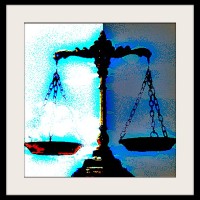Can I get a witness?
 If there’s one big lesson from today’s message it would be this: Be prepared so that when God asks you “Can I get a witness?” your answer can be a resounding “Yes”!
If there’s one big lesson from today’s message it would be this: Be prepared so that when God asks you “Can I get a witness?” your answer can be a resounding “Yes”!
Can I get a witness? The answer in today’s passage (Acts 22:30-23:11) would be three-fold: “Apparently not, Yes, and Yes again.” Last week, Paul was sent by the Roman commander into the barracks and ordered to be flogged until Paul’s citizenship of Rome made that form of questioning impossible, not to mention illegal.
The commander still wants to know what’s going on—why all the unrest among the populace—so he figured, it must be a religious matter for all those Jews. He brings Paul before the Sanhedrin (the governing Council of the Jews) to stand trial on religious grounds.
Religious problem, religious solution. Seemed pretty reasonable.
But can I get a witness? Apparently not.
So Paul the defendant was having to testify against himself. This wasn’t legal in a fair trial, but the Sanhedrin wasn’t too concerned. Why should they be? They weren’t concerned about a fair trial with Jesus (whom they handed over to be crucified by the Romans), or with Stephen (whose angel face and stellar defense made their guilt obvious, so they stoned him), so why should they care about a fair trial with Paul? Don’t have any real witnesses? No problem. Just make Paul testify.
Can I get a witness? Yes, Paul would witness to them and they’d get more than they’d bargained for.
Acts 22:30 The next day, since the commander wanted to find out exactly why Paul was being accused by the Jews, he released him and ordered the chief priests and all the Sanhedrin to assemble. Then he brought Paul and had him stand before them.
Acts 23:1 Paul looked straight at the Sanhedrin and said, “My brothers, I have fulfilled my duty to God in all good conscience to this day.”
A one-line defense argument, but what a line it is! Paul testified that he has fulfilled his duty to God (that is, preaching the Good News among the Gentiles).
This went over like a lead balloon with the Sanhedrin and the high priest Ananias (who by the way, isn’t the same Ananias as the guy who fell over dead in Acts 5 along with his wife Sapphira, or the same Ananias as the guy who was told Paul was the chosen instrument to witness to the Gentiles and told Paul to receive his sight). Ananias was a pretty common name.
2 At this the high priest Ananias ordered those standing near Paul to strike him on the mouth.
Paul speaks a one-line defense, saying that he’d done his duty to God…and then the high priest Ananias orders an illegal action: the striking of an accused man before he’d received a trial. History repeats itself. It happened to Jesus in His trial before the Jewish religious officials and with the Roman authorities, and now it’s happening to Paul at his trial.
What you’re about to hear in the next 3 verses may be among the most… confusing… uncertain… or perhaps selectively ignored things in the Bible. Bible commentators, those people who devote their lives to extended study of Scripture and write books about it, have developed a consensus view that they all repeat to themselves. But as a mother, I’ve learned that no matter how many times my teenagers told me something that didn’t quite add up, repeating it with emphasis or increasing volume or energy, still didn’t make it true. If it doesn’t add up, it doesn’t add up. The consensus view of these 3 verses doesn’t add up:
3 Then Paul said to him, “God will strike you, you whitewashed wall! You sit there to judge me according to the law, yet you yourself violate the law by commanding that I be struck!”
4 Those who were standing near Paul said, “You dare to insult God’s high priest?” 5 Paul replied, “Brothers, I did not realize that he was the high priest; for it is written: ‘Do not speak evil about the ruler of your people.'”
 When I first organized this sermon series, I was worried there wasn’t going to be much to build a sermon on. But as I began to research it, I discovered there’s a lot here. And many commentators and theologians say that what just happened was that Paul, stressed out from nearly being torn to pieces by the crowd and put in jail, nearly flogged, and then forced to testify against himself before the Sanhedrin…well, he loses his cool and shows a “rare display” of his sinful humanity.
When I first organized this sermon series, I was worried there wasn’t going to be much to build a sermon on. But as I began to research it, I discovered there’s a lot here. And many commentators and theologians say that what just happened was that Paul, stressed out from nearly being torn to pieces by the crowd and put in jail, nearly flogged, and then forced to testify against himself before the Sanhedrin…well, he loses his cool and shows a “rare display” of his sinful humanity.
These commentators say that the stressed-out Paul, convicted by his speaking ill of authority, then apologizes to the office of high priest and perhaps Ananias directly.
Oh, they give all kinds of reasons. Paul’s eyesight was really bad from the blinding light and the scales on his eyes. He couldn’t see! The high priest was a different one than he’d dealt with before. He didn’t know there had been a change. He was superficial and confused because he was looking for a guy dressed like the high priest. All kinds of excuses. Why? Because theologians are quick to remind us that when Christ was struck upon the mouth, He did not retaliate or say anything troubling. Paul didn’t do that and therefore Paul sinned. But we hold Paul in high regard, so we’ll come up with good excuses to make his sin seem less sinful and turn his words into an apology. That’ll do it.
While that particular instance with Christ is true because Scripture says so, my instincts are to believe that, with Paul, an apology doesn’t quite add up.
Regarding our passage today, I believe theologians and commentators are too quick to dismiss the uncomfortable and hard-to-justify. Simply brushing it off as,
Oh well, just goes to show Paul was human and imperfect like the rest of us. He must apologize!”
Yes, Paul was human, not superhuman, but I don’t find that brushing it off squares with the rest of the Bible or with how things were in the culture of Paul’s day. It’s a convenient dismissal of something they’re embarrassed about and what it does is, it robs the passage of some of its power. Just pass it off as sin. When instead it’s great witnessing.
Can I get a witness? Yes! And Paul is the best.
Have these commentators misunderstood the mind of a man like Paul or the powerful impact of his having seen the last of the Resurrection appearances of our Risen Lord, or the clear commission—from God Himself–to go and preach to the Gentiles when it wasn’t exactly on Paul’s radar? Surely these commentators have never–in or out of the body–been carried into the third heaven and given a thorn in the flesh like Paul tells us about (2 Cor 12:2). They probably have never been in the suffering shoes or sandals of one who has the gifts of a prophecy and exhortation and the clear call from God to use it. One in the same personality mold as Amos or Elijah. Ones commissioned by God to share the very heart of God, both powerful love He has for us and also the immensity of wrath boiling away when God is continually confronted with a disobedient people…who had been given every opportunity and rejected Him over and over and over again.
So did I just blow off this consensus and stubbornly stick with my gut instinct? No.
In Congregational churches, we enjoy the understanding that we can think independently and come to our own theological conclusions. But in doing so, we must be careful how we interpret. While I was fine with going with my gut, I also began to dig deep to try to figure out why my gut was different than the party line of so many commentators. There is no shortcut through digging deep. And it takes time to do it. This week, lots of time. In doing this research, however, I found that I had a few friends among commentators …like John Calvin and F.F.Bruce who saw things similarly to how I am seeing things.
I’ve concluded that in these 3 verses, Paul was witnessing to many things and if all these commentators see is the hothead Paul losing his cool, sinning, and apologizing, they don’t see what I see. Maybe they see themselves in Paul, their own anger issues…their own nasty jabs…their own need for repentance, or their wimpy tuck-tail-and-run tendency. Yes, there’s wisdom in holding one’s tongue unless God is asking “Can I get a witness?” Paul’s answer was Yes!
Paul was a witness for many things with the vast backstory of 3 verses: First, Scripture!
He was a witness for the whole of Scripture.  We cannot rely on one verse alone, but must consider Scripture as a whole in all its detail. In the whole span of Scripture, Paul’s technique may appear rough around the edges, but there’s plenty of biblical precedent, even in the NT and from Jesus Himself. Paul would have known what Jesus said even if Paul’s primary written Scriptures would have been our Old Testament. Why? Because in a little tiny verse of Galatians, Paul explains how he knows what he knows:
We cannot rely on one verse alone, but must consider Scripture as a whole in all its detail. In the whole span of Scripture, Paul’s technique may appear rough around the edges, but there’s plenty of biblical precedent, even in the NT and from Jesus Himself. Paul would have known what Jesus said even if Paul’s primary written Scriptures would have been our Old Testament. Why? Because in a little tiny verse of Galatians, Paul explains how he knows what he knows:
Galatians 1:12 I did not receive it from any man, nor was I taught it; rather, I received it by revelation from Jesus Christ.
Paul would have known from Jesus during Paul’s time in Arabia
- Jesus said woes to the Pharisees and teachers of the Law (Matthew 23), called them whitewashed tombs and hypocrites, sons of hell, sons of the devil, snakes, a brood of vipers, but it wasn’t sin. Scripture clearly says that Jesus never sinned. (Hebrews 4:15) And Jesus didn’t apologize for saying any of that.
- Paul would have known that Jesus said, Matthew 10:17 “Be on your guard against men; they will hand you over to the local councils and flog you in their synagogues. 18 On my account you will be brought before governors and kings as witnesses to them and to the Gentiles. [The Gospel cuts both ways!] 19 But when they arrest you, do not worry about what to say or how to say it. At that time you will be given what to say, 20 for it will not be you speaking, but the Spirit of your Father speaking through you.” And Paul believed it.
- And the whole of Scripture affirms this, even in verse 11 from today’s passage: 11 The following night the Lord stood near Paul and said, “Take courage! As you have testified about me in Jerusalem, so you must also testify in Rome.” Not minus that little slip up, minus that little insult to authority. “As you have testified” with “the Spirit of your Father speaking through you.” Paul believed it. Why should commentators reject the clear instruction of Christ to turn Paul’s words into an apology? It just doesn’t add up.
- Consider also that Paul had been there at Stephen’s defense when he heard Stephen talk about the real ruler, Acts 7:49 “‘Heaven is my throne, and the earth is my footstool. What kind of house will you build for me? says the Lord. Or where will my resting place be? 50 Has not my hand made all these things?’ 51 “You stiff-necked people, with uncircumcised hearts and ears! You are just like your fathers: You always resist the Holy Spirit! 52 Was there ever a prophet your fathers did not persecute? They even killed those who predicted the coming of the Righteous One. And now you have betrayed and murdered him– 53 you who have received the law that was put into effect through angels but have not obeyed it.” How can all these commentators just pass off that Paul was a witness of what happened to Stephen in front of that same Council?? Hard words, principled words there too, to rulers…and no apology from Stephen. Hello?
- Maybe these commentators don’t like Paul saying it to a religious leaders and rulers. Maybe because they consider themselves to be religious leaders. Well, Paul was thoroughly trained in the Scriptures. He would have known Zechariah 3:8 “‘Listen, O high priest Joshua and your associates seated before you, who are men symbolic of things to come: I am going to bring my servant, the Branch.” You see, men are merely symbolic of the One to come…the Branch, the One who is Jesus. He is the real High Priest. He is the real ruler. And Paul knew it.
- Paul would surely have recalled that God was unimpressed with the Jewish rulers, those shepherds of Israel. Ezekiel 34:10 “This is what the Sovereign LORD says: I am against the shepherds and will hold them accountable for my flock. I will remove them from tending the flock so that the shepherds can no longer feed themselves. I will rescue my flock from their mouths, and it will no longer be food for them.” Paul would have known that Jesus is that Good Shepherd and He alone is a just ruler, unlike men whose justice is…let’s just say…at times, pretty questionable.
Paul knew his Scriptures and this was one part of the backstory that commentators diminish to an unwarranted apology and in doing so, they strip Paul’s defense of its power. In the whole of Scripture, God held a low view of human rulers and criticizing them was something godly men were often called to do as witnesses by and for God. One verse doesn’t stand alone. Paul witnessed to the whole of Scripture and more than that though,
 Paul was a witness to his knowledge of the history of Judaism
Paul was a witness to his knowledge of the history of Judaism
In the history of Judaism, who were the rulers? They were prophets like Moses or priests like his brother Aaron. So is that why Paul owes the high priest an apology? Well, I don’t think so. There were no rulers except the priests from the house of Levi. Established by God. There was no king at that time but God…and rulers were only those serving Him faithfully. Deuteronomy 21:5 The priests, the sons of Levi, shall step forward, for the LORD your God has chosen them to minister and to pronounce blessings in the name of the LORD and to decide all cases of dispute and assault.
- Rulers were not always good rulers. God killed off Levi’s sons that offered unauthorized incense demonstrating that even then, God judged between good priests and bad priests. Leviticus 10:1 Aaron’s sons Nadab and Abihu took their censers, put fire in them and added incense; and they offered unauthorized fire before the LORD, contrary to his command. 2 So fire came out from the presence of the LORD and consumed them, and they died before the LORD.
- So Barb, are you saying that Paul knew Ananias was a bad priest? Well, yeah. But another part of history that Paul would have known is the description in Ezekiel 10 when the glory of the Lord departed from the temple. His glory up and left because God was so fed up with the meaningless sacrifices, illegalities, and injustice. Poof! God was no longer in the temple and would never come back to dwell in a manmade temple. The people were exiled to Babylon for 70 years and the whole sacrificial system went completely unobserved that entire time. (Have you ever wondered why Jews today don’t offer sacrifices at the Wailing Wall? The sacrificial system is gone just as it was in the exile for 70 years.) And yes, the office of high priest and the sacrificial system were eventually reinstated—but not by God—reinstated by a Roman general named Pompey. Rome gave the Jews of Jesus’ day their high priest and Rome reinstituted the sacrificial system. Rome turned the lights on to keep the Jews happy, but there was nobody home. God wasn’t in the temple no matter how fancy King Herod made it or how powerful Rome was.
- So are you saying that Ananias wasn’t really a high priest at all by God’s standards? Yes. He was just a political operative. A Sadducee in bed with Rome. It’d be like if our President sets up a head of the church in the US as a religious/political appointment. Or like the King of England ruling over the Church of England back when the Pilgrims came. The high priest was supposed to be selected from among men, but called by God. While Paul didn’t write Hebrews 5:1-4, he was thoroughly trained to know this. Hebrews 5:1 Every high priest is selected from among men and is appointed to represent them in matters related to God, to offer gifts and sacrifices for sins…4 No one takes this honor upon himself; he must be called by God, just as Aaron was.
- So what else did Paul know about Jewish history? He knew that Jesus came, born as the King of Kings (greater than Herod), our Great High Priest (greater than Ananias), and the Lord of Lords (even over the Emperor of Rome). Jesus fulfilled the sacrificial system by being the perfect sacrifice for sin. He didn’t need a human high priest at all, He became ours! In our text, the official who hit Paul said how dare you insult “God’s high priest“? What? Ananias, God’s high priest? Paul would have been repulsed by such a thought! Jesus is God’s High Priest and Paul met Him on the Road to Damascus!
After the resurrection of Christ which proved His Messianic status, His Kingship, His Priesthood, and His divinity, who is the high priest? A man, or the Risen Lord? Paul witnessed to Jesus as High Priest and Ruler because Paul knew his history of Judaism and had seen it fulfilled in Christ.
 He was thoroughly trained as a witness to the Law.
He was thoroughly trained as a witness to the Law.
Can I get a witness?
Yes!
So Paul quotes only part of Exodus 22:28 to the high priest Ananias. The punch from Paul wasn’t in what he said, but it what he didn’t say.
He quoted, “Do not speak evil about the ruler of your people.“
Ananias was presumably trained enough to know the full verse: “Do not blaspheme God or curse the ruler of your people.” (Exodus 22:28 )
Details in the Bible are there for a reason. Paul quotes only part of that verse leaving the convicting part as a fill-in-the-blank for Ananias. You see, the high priest heard Paul’s one-line defense of doing his duty and judged it as blasphemy worthy of being struck in the mouth. But God was on Paul’s side. The high priest had presumed to know and judge better than God. Being above God. And that’s blaspheming God.
So which is the greater crime: blaspheming God or pointing out the hypocrisy and miscarriage of justice by a man who had been appointed by Rome and was a political operative Sadducee? The legitimacy of the high priest Ananias was questionable first because he was appointed by Rome, and he assumes he knows better than God, but also…
For Ananias to order Paul to be struck in the mouth was a miscarriage of justice, striking the accused, violating all kinds of Law including, Exodus 23:1 “Do not spread false reports. Do not help a wicked man by being a malicious witness. 2 Do not follow the crowd in doing wrong. … 7 Have nothing to do with a false charge and do not put an innocent or honest person to death, for I will not acquit the guilty.”
All this to say that Paul knew the Law and that the high priest wasn’t following it. F.F. Bruce says that Paul’s statement in verse 5 Paul replied, “Brothers, I did not realize that he was the high priest; for it is written: ‘Do not speak evil about the ruler of your people.'” Could easily carry the meaning: I did not think that a man who behaved so illegally [as to order him to be struck across the mouth] could possibly be the high priest.
 And finally, Paul was a witness to his times.
And finally, Paul was a witness to his times.
We cannot take Paul out of his culture or his experience with the Risen Lord. Paul understood what the empty tomb meant for the culture of his day and for all human history.
The kings named Herod were client kings of Rome and not godly. They were of Arab and Idumean (Edomite) descent and influenced by Rome which appointed them to be a dynasty of kings who appointed high priests—high priests who were Sadducees, political appointments for political suck-ups to Rome and its client kings.
This was politics, really, and not God-honoring religion at its very heart.
We won’t look at it in detail this week but now Paul changes the topic to the Pharisees and the Resurrection which was a defining disagreement with the Sadducees. It’s not Paul doing a diversion tactic because Plan A didn’t work. Doing some fancy footwork to avoid being sacked behind the line of scrimmage.
Why did Paul change the topic to the Resurrection? It was key to Paul’s understanding of Jesus as both King and High Priest.
Politically, Paul affirmed the Pharisees against the Sadducees who began to argue. Paul knew the Resurrection happened and the empty tomb makes a difference, even in a political culture.
Paul witnessed in Jerusalem. Can I get a witness? Yes!
And he will do the same in Rome. Can I get a witness? Yes, again!
I don’t really care what some commentators might say about my view of this. Paul’s words about God striking the high priest were probably not the “rare display of sin” and the “human reaction” of a hot head. Why? Because the words were, in fact, prophetic and true. Josephus tells us that not long afterward, Ananias’ wickedness caught up with him and he was struck down by his own people during a revolt.
All this history may seem like fishing in a bunch of weeds. Maybe it’s all fine and good, but you’re wondering, what does it mean for you and me?
It doesn’t mean we can go shooting off our mouths to authorities and be loose cannons rolling around the deck of the ship blowing holes wherever we feel like it. Being a great big ball of fire in search of a can of kerosene.
But it does mean that we can thoughtfully disagree, even with scholars. But our witness must show a thorough knowledge of Scripture, a deep understanding of the Law, the vast truth of our history, and an acute awareness and discernment of our times.
Be prepared ahead of time by knowing His Word, studying His Word, so that when God asks you,
Can I get a witness?” your answer can be “Yes and Yes again”. Amen?